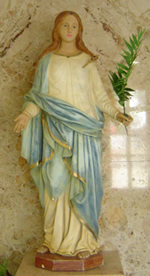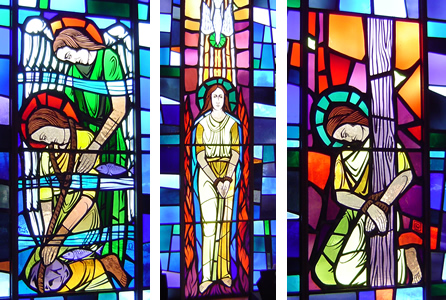 July 24th is the feast day of St. Christina. She was a martyr in the early Church. Her death in 300 A.D. is another example of those who selflessly gave their lives to defend the Faith and spread the message of the Gospel. Thirteen years after her death, Constantine the Great legalized Christianity and was Baptized before he died. July 24th is the feast day of St. Christina. She was a martyr in the early Church. Her death in 300 A.D. is another example of those who selflessly gave their lives to defend the Faith and spread the message of the Gospel. Thirteen years after her death, Constantine the Great legalized Christianity and was Baptized before he died.
Saint Christina was born around the year 290 A.D. The Roman Empire was in increasing disarray with many insurrections and wars. Christianity was not only illegal and forbidden, but Christians were routinely rounded up and physically persecuted and executed.
St. Christina was born in Tyro in the Tuscany region of Italy. The town was built on an island in the lake near Bolsena which has since sunk. Her father, Urban Anicii, was the Roman Prefect for the island. In today’s terms, his position was a combination of governor and judge. Her father was solidly in league with the Roman Empire. The people of the Roman Empire worshipped many gods, much like Greek mythology. Urban was deeply attached to his Roman assortment of deities. It was a way of life before Christianity took hold.
Urban was an enemy to the Christians, and hardly a day passed when he did not call one of the Faithful into his presence and doom them to suffering and death. Christina was just a child, but on seeing this, she was struck by how fearless and happy the Christians were during their torments. She was curious to know what kind of people these were, why they were persecuted and what gave them the strength to bear the sufferings they endured.
Christina sought out someone who could teach her about the Christian faith. In time, she was Baptized as a Christian without her parents’ knowledge. Shortly thereafter, she took her father’s idols, composed of gold and silver, and with the help of others, broke them into pieces and gave them to the poor. Her father was furious and resolved to avenge the dishonor done to the gods with his daughter’s blood. At first he tried to win her over with kindness. He kept encouraging her to forsake Christ and she refused. She is reported as saying: “Do with me whatever you like, my dear father; you can take my life, but the faith of Christ you have no power to tear out of my heart. My Savior will strengthen me to suffer patiently all that you have threatened.”
Her father ordered her to be beaten. She gave no signs of pain in her suffering. Her father had her beaten again but Christina looked to heaven and thanked Almighty God for aiding her to bear her pain. Her father then ordered that she be tied to an iron wheel. A fire was lit beneath it to roast the girl. As she sang a song of praise, she remained unhurt by the flames. Her father then threw her into a dungeon only to begin again the next day.
While in the dungeon, an angel appeared to her and healed her wounds. The angel encouraged her to persevere and gave her assurance of divine assistance. When her father heard of her healing he sent an executioner to the prison to tie a large stone around her neck and cast her into the lake. The same angel who had visited her the day before carried her safely to shore. Her father was beside himself and sent her back to the dungeon. That night her father died. He was found dead the next morning. It is presumed he died from a stroke or apoplexy brought on by his uncontrolled anger.
Dio was Urban’s replacement as Prefect. He was even more cruel towards Christians than Urban. He had Christina brought to him and ordered an iron cradle to be built and filled with boiling oil and tar. Christina was summoned and immersed in the cradle. She made the Sign of the Cross and said to the soldiers, “…you have reason to lay me like a child in a cradle; for it is hardly a year since I was born in Holy Baptism.” She was not harmed or experienced pain through the ordeal.
Dio then had Christina taken to the temple of Apollo. She was directed to make fitting sacrifice to Apollo. When Christina stepped into the temple, she made the Sign of the Cross and the image of Apollo fell from the altar and was broken into a thousand pieces. The soldiers who brought Christina to the temple were terrified and released her saying, “Truly the God of the Christians is the one true God.” Many of those who witnessed this event became Christian.
Julian succeeded Dio as Prefect. He was even more ruthless. He gave Christina a choice: sacrifice to the gods or be thrown into a fiery furnace. She would not do it so they threw her in the furnace. She remained in it for five days unharmed - much like the companions of Daniel in the Old Testament during their exile in Babylon. (See Daniel Chapter 3). Since that did not work, Julian had Christina taken to a cavern with many vicious animals. She made the Sign of the Cross and none of the animals touched her. She sang praises to God and the animals listened. The guards, tired of her songs, tore out her tongue. She was finally tied to a pole and shot with arrows. With that, Christina went to heaven to meet her Maker.
One Sunday in 1263, a German Priest, Peter of Prague, was celebrating Mass above the tomb of St. Christina in the town of Bolsena. When he raised the host, blood started to trickle over his hands and onto the Altar. A year later, after investigation and authentication, the miracle was confirmed. It so moved Pope Urban IV that he instituted the new feast of the Body and Blood of Christ (Corpus Christi). The white, blood-stained linen corporal cloth can still be seen in Orvieto Cathedral north of Rome. St. Christina was a very popular saint in the West and was one of the patron saints of sailors, archers, and millers. Her relics are now in Palermo in Sicily.
Our patroness, St. Christina gives us an example of a loyal steadfast faith which enables us to grow in our Christian life. Like Christina, we may be called to defend our faith more on the grounds of personal convictions and style of life rather than actually laying down our life. We have from her example and examples of countless martyrs, the opportunity to be as generous and as selfless in our own lives within our parish community.

|
